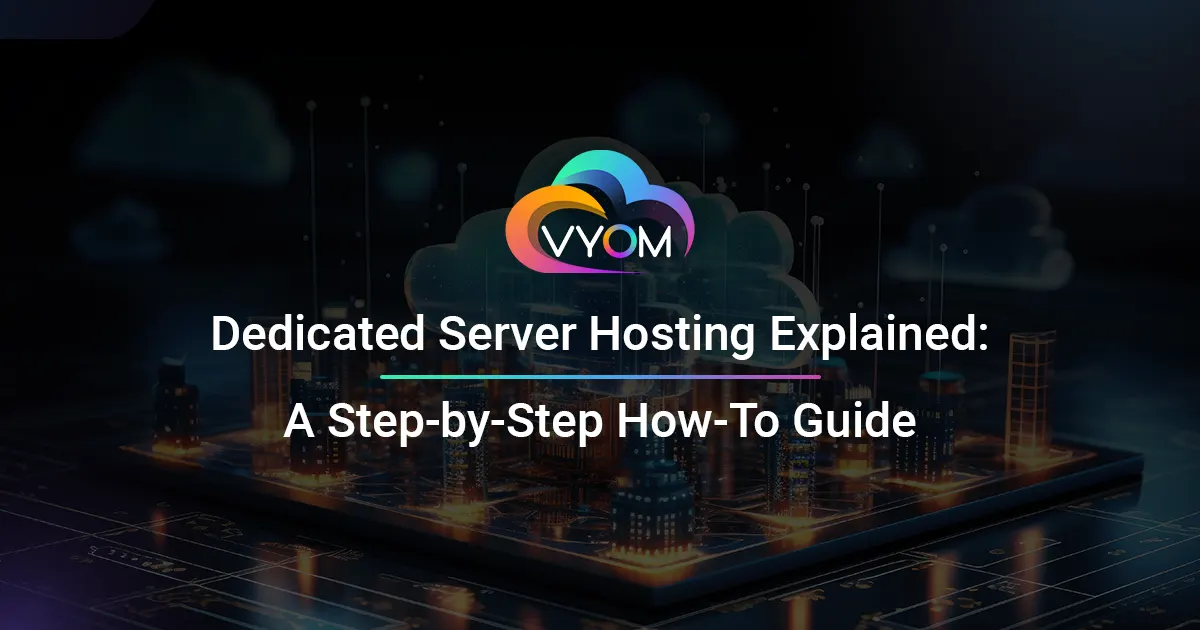- Dedicated Server Hosting Explained: A Step-by-Step How-To Guide
- What’s Dedicated Server Hosting?
- Why Dedicated Over Shared or VPS?
- Core Dedicated Server Components
- Setup Your Dedicated Server
- Future of Indian Dedicated Hosting
- Conclusion
- Frequently Asked Questions (FAQs)
- 1. What is a dedicated server and how does it work?
- 2. Is dedicated server hosting suitable for Indian businesses?
- 3. How do I choose the right dedicated server for my business?
- 4. What operating system should I choose – Linux or Windows?
- 5. How secure is a dedicated server for handling sensitive data?
- 6. Can I upgrade my dedicated server as my business grows?
- 7. What’s the role of Indian data centers in dedicated hosting?
- 8. Is managed dedicated hosting a better option for SMBs?
- 9. Can a dedicated server handle high-traffic apps and eCommerce sites?
- 10. How long does it take to deploy a dedicated server in India?
Dedicated Server Hosting Explained: A Step-by-Step How-To Guide
The correct hosting infrastructure is crucial in a digital age where corporate success depends on it. Dedicated server hosting is trustworthy, powerful, and secure for fast-growing Indian and global organizations. From operating high-traffic applications to controlling computing resources, dedicated hosting is essential for company operations. This comprehensive tutorial covers understanding, selecting, and deploying dedicated server hosting, especially in India, where regulatory compliance, performance consistency, and data sovereignty are crucial.
What’s Dedicated Server Hosting?
In dedicated server hosting, the entire physical server is dedicated to one client. Dedicated hosting gives one organization complete processing power, storage, bandwidth, and memory, unlike shared hosting or VPS. Businesses have full control over the server’s operating system, security, and applications with root access. This level of control and customisation is critical for handling sensitive data and providing consistent user experiences in finance, healthcare, and education, especially in diverse and fast-growing countries like India.
Why Dedicated Over Shared or VPS?
While cheap, shared hosting is best for tiny websites with little traffic. It limits performance, configuration, and security. Virtualization improves control in VPS hosting, but users share hardware. Dedicated hosting isolates one customer on an isolated server, ensuring reliability, stability, and security. Dedicated hosting protects latency, compliance, and performance for Indian enterprises handling digital payments, regulatory audits, and multilingual applications for rural and urban audiences.
Core Dedicated Server Components
Every dedicated server has essential parts that affect performance. The CPU, or processor, is the brain and must match the application’s processing needs. Indian companies utilizing AI models or enterprise-grade ERP systems may choose multi-core Intel Xeon or AMD EPYC CPUs. RAM size influences real-time performance and multitasking. High RAM capacity ensures smooth content delivery to students and viewers during peak hours for Indian e-learning portals and OTT platforms.
Solid-state drives (SSDs) are speedier and more reliable than HDDs. SSDs in RAID improve performance and data security. In Tier 2 and Tier 3 cities in India, uneven internet speeds might hurt user experience. Static IPs and resilient network configurations offer reliable services, secure communication, and higher search engine rankings.
Determine Business Needs
Before choosing a server, assess your hosting needs. This includes assessing online traffic, growth, software needs, compliance, and budget. Mumbai-based financial firms with nationwide operations need redundant backups, disaster recovery, and hybrid cloud. However, a local manufacturer digitizing its supply chain may merely need consistent uptime and third-party API integration. Both instances require knowledge about CPU power, memory, disk storage, and geographic demand to optimize server configuration.
Selecting an OS
Choosing an operating system is crucial to establishing your dedicated server. Most providers offer Linux and Windows-based solutions. Ubuntu, CentOS, and Red Hat are popular Linux OSes for open-source environments, development flexibility, and cost-effectiveness. Indian ed-tech, SaaS, and logistics platforms use PHP and Node.js/Python.
However, organizations using Microsoft software like ASP.NET, MSSQL, and SharePoint benefit from Windows OS. Indian enterprise software companies and digital service exporters love this. The OS determines program compatibility, security, and long-term scalability. Choose one that matches your development team’s experience and business goals.

Setup Your Dedicated Server
Once you buy a server, setup begins. Most providers will set up the basics, but you should customize them. Set up server monitoring tools, firewalls, and intrusion detection systems after installing the OS. Keep software updated, setup DNS, and enable SSH/RDP. India’s commercial environment, where banking and education are often targeted by cyberattacks, need high-quality protection and backup.
Whatever your backend needs, MySQL, PostgreSQL, or MongoDB database administration is crucial. Your program needs load balancing if it expects high traffic. Maintaining data integrity requires automated daily snapshots and manual offshore backups.
Security and Compliance Management
Indian enterprises choose dedicated servers for security. Custom firewalls, encryption layers, secure VPNs, and complex authentication systems are possible in a private environment. Indian BFSI enterprises must follow RBI data localization and secure transaction processing requirements. Uncompromised encryption, access controls, log monitoring, and API security are possible with a dedicated server.
Companies must also have strong data governance systems under data privacy laws like India’s DPDP Act. Businesses can ensure data never leaves India with dedicated hosting, providing peace of mind and regulatory compliance.
Indian Workload Performance Optimization
Continuous performance monitoring and optimization are essential for dedicated server success. Grafana, Zabbix, or custom server dashboards can track CPU, memory, disk I/O, and network activity. Regular performance audits prevent bottlenecks. CDNs and edge caching must be incorporated for Indian apps serving varied geographies to reduce latency in remote places.
Timely hardware upgrades, database indexing, and caching keep the server running efficiently. Indian e-commerce platforms benefit from optimization during flash sales and festivals, when website crashes can cost money and customer trust.
Indian Real-World Examples
A fast-growing Pune insurance aggregator switched to a dedicated server after severe outages on shared hosting. Customer turnover dropped by over 20% after the switch since their quote-generation engine processed 2.5x more transactions per second and responded faster.
Another Indian AI business trained big regional language models on GPU-powered dedicated servers. They combined on-premise systems with Tier IV Indian data center-based high-performance dedicated servers. Their training time dropped from 14 to just 4 days.
A government organization managing agricultural data in numerous Indian states switched to dedicated servers to comply with localization laws. Farmers received improved advisories due to faster analytics and secure API connectivity with meteorological and crop databases.
How to Overcome Challenges
Dedicated servers offer unrivaled control and performance, but they cost more, need experienced technical administration, and risk overprovisioning. Fearing complexity, Indian SMBs stay away. Managed dedicated hosting services handle monitoring, patching, scaling, and security, reducing these issues.
Local data centers with Indian compliance-savvy support personnel help meet regulatory obligations. Bundling disaster recovery, 24×7 monitoring, and hybrid cloud compatibility provides future-proof support.
Future of Indian Dedicated Hosting
Demand for resilient, sovereign, and scalable hosting solutions will rise as India develops a digital-first economy. Digital India and public and private sector adoption of AI, IoT, and blockchain would make dedicated hosting essential for national infrastructure. To better service Tier 2 and Tier 3 cities, edge data centers are becoming popular.
Rising Indian data centers with high compliance, low latency, and power-efficient design provide local firms confidence to scale securely. In the coming years, dedicated hosting will become modular, cost-efficient, and AI-optimized while keeping data in India.
Conclusion
Performance, control, and security are long-term investments in dedicated server hosting. It helps Indian fintech, ed-tech, government services, and e-commerce companies construct scalable, compliant, and high-performing digital platforms. Understanding your goals, preparing your configuration, and choosing a reputable provider are essential to maximizing dedicated infrastructure. As data drives growth in India, well-managed dedicated hosting will remain a strategic advantage.
Frequently Asked Questions (FAQs)
1. What is a dedicated server and how does it work?
A dedicated server is a physical server exclusively assigned to one client or business. It provides complete control over resources, configuration, and security, unlike shared or VPS hosting.
2. Is dedicated server hosting suitable for Indian businesses?
Yes, Indian businesses benefit from data localization, enhanced performance, regulatory compliance, and low latency when using dedicated servers hosted within India.
3. How do I choose the right dedicated server for my business?
You should assess your traffic, processing requirements, compliance needs, operating system preference, and budget to configure a server tailored to your workload.
4. What operating system should I choose – Linux or Windows?
Linux is preferred for open-source development and cost-efficiency, while Windows is ideal for Microsoft-stack applications like ASP.NET, MSSQL, and SharePoint.
5. How secure is a dedicated server for handling sensitive data?
Dedicated servers offer maximum security with custom firewalls, encryption, private networks, VPNs, and access control systems—ideal for sectors like finance, healthcare, and edtech.
6. Can I upgrade my dedicated server as my business grows?
Yes, dedicated servers offer scalability through hardware upgrades (RAM, CPU, SSDs) and hybrid cloud integrations to support business expansion.
7. What’s the role of Indian data centers in dedicated hosting?
Indian data centers ensure compliance with local laws, deliver low-latency performance to domestic users, and support sovereign data infrastructure needs.
8. Is managed dedicated hosting a better option for SMBs?
Yes. Managed hosting takes care of server setup, monitoring, backups, patching, and security—ideal for SMBs without in-house IT expertise.
9. Can a dedicated server handle high-traffic apps and eCommerce sites?
Absolutely. Dedicated servers are built for high-traffic applications like eCommerce, OTT platforms, insurance portals, and large enterprise systems.
10. How long does it take to deploy a dedicated server in India?
Most providers can provision a server within 24–72 hours, including OS installation, security hardening, and initial setup.
Read More : What is VPS? A Detailed Guide to Virtual Private Servers
Let’s Get Social:
Facebook: https://www.facebook.com/vyomcloudnetwork/
LinkedIn: https://www.linkedin.com/company/vyomcloud/
Instagram: https://www.instagram.com/vyomcloud/

